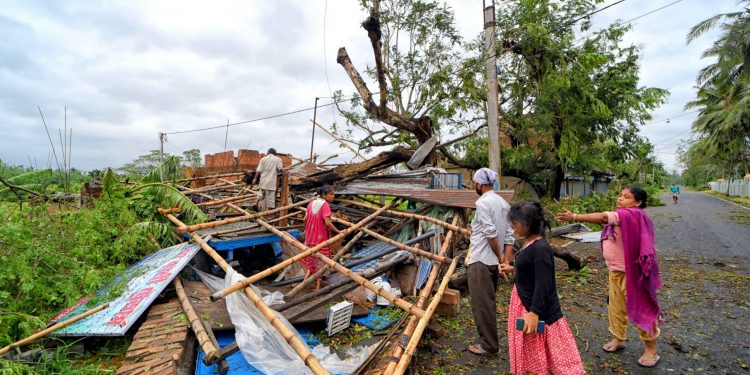Mousuni: Thousands of Bengal’s Mousuni island residents, who depend on agriculture and tourism for a living, are staring at an uncertain future, with Cyclone ‘Yaas’ dealing a fresh blow to the local populace that had already been grappling with the COVID-19 crisis.
The administration in South 24 Parganas district has given assurances that assistance will reach them soon, but villagers are wary that it would take them a long time to get back on their feet.
Sunderban Affairs Minister Bankim Hazra, who visited the island along with senior police and administration officials during the day, said cooked food, drinking water and medicines were being distributed among the affected villagers, and help would subsequently reach one and all.
A community kitchen which can cater up to 1,000 people was inaugurated on the occasion. Large swathes of agricultural land and fish farms in this low-lying island — at the confluence of the Bay of Bengal and river Hooghly — went under saline water that gushed in Wednesday morning, as ‘Yaas’, accompanied by heavy rain, made its landfall.
People living in the southern part of the picturesque island, which boasts of coconut tree-lined virgin beaches, had been thriving on its flourishing tourism business until 2020, when the pandemic and Cyclone Amphan struck one after another – leaving the place in tatters.
Last week’s calamity has worsened their plight, as many homes still lay submerged, and local villagers frantically wait for government relief.
Tapan Mondal, owner of ‘Sonar Tori’ resort at Balliara village here, said, “The situation is bad… The pandemic has hit hard the tourism business, and additionally this cyclone left the area in a shambles.
“Unless the government extends assistance, the tourism business, which provides succour to several people here, will not be able to spring back into shape anytime soon.”
Subodh Das, who earns a living from pisciculture, said saline water has killed fish in his two ponds, where he cultivates local sweet-water varieties like ‘rohu’, ‘katla’ and ‘tyangra’.
“The future is uncertain… I am at my wits’ end trying to find ways to make ends meet, after having lost my regular income,” he lamented.
Balliara, home to around 3,000 residents, and other hamlets on the island have been ravaged by the disaster, with several of them forced to move out of flooded homes.
“Some houses have been reduced to debris, and people have lost everything — from valuables to necessary documents such as bank pass books, Aadhaar cards and educational certificates,” he said.
Alam Sheikh, who owns a small agricultural plot on the island, said that he won’t be able to grow anything there for the next ten years as the topsoil has been washed away.
“Saline water flooding the land may recede in a day or two, but the plot will not be arable in a long time,” Sheikh, who has seven mouths to feed at home, including children and aged mother, said.
Many villagers, with their homes in ruins, have put up at cyclone shelter camps set up in local school building, while some have taken refuge in nearby resorts.
Mondal said some resorts, including his, have welcomed the cyclone-affected villagers. He also insisted that a 2.5-km-long embankment should be built to prevent the water from entering the villages in and around Balliara, situated on the southern part of the island facing the sea.
“A 500-metre-long embankment was erected after Amphan, but that has proved to be too ineffectual to stop the seawater from gushing in, as was evident during Yaas,” Mondal, who is also a local resident, added.







































